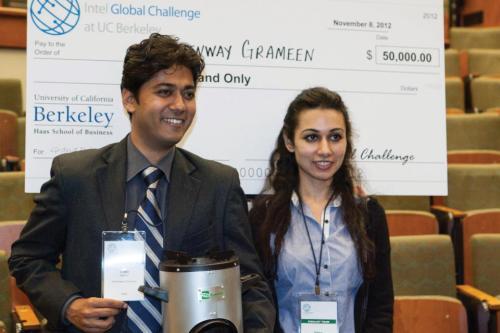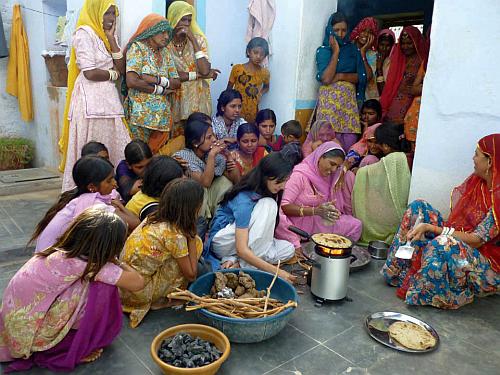Photographs: Courtesy: Facebook.com/greenwaygrameeninfra Ritu Jha
Two young entrepreneurs discuss their winning idea and how they plan to scale their business with Ritu Jha.
Neha Juneja is surprised that her company Greenway Grameen Infra won the 2012 Intel Global Challenge at Haas School of Business, University of California, Berkeley, receiving $50,000 from the Intel Foundation November 9.
The Intel Global Challenge is a joint project of Intel and the UC Berkeley Lester Center for Entrepreneurship. Started in 2005, it rewards student entrepreneurs for innovative ideas that can make a positive impact on society.
The Intel Foundation awards a total of $100,000 in cash prizes -- $50,000 to the best team, followed by $15,000 each to the three best-of-category winning team, and $2,500 each to a social media challenge and an audience favorite contest.
Greenway Grameen Infra -- selected from ideas presented by more than 150,000 students from more than 50 countries -- was founded in 2010.
The firm's biomass-based stove increases fuel efficiency and targets consumers in rural areas. The single-burner, high-efficiency cook stove uses 65 per cent less fuel and produces 80 per cent less smoke than traditional stoves called chulhas.
In late 2011, the company won the Businessworld Young Entrepreneur Award.
Juneja, 27, co-founder and chief executive officer, told India Abroad, "I was surprised because the other participants were very good. All of them had unique ideas, so I was a little nervous. It's like getting a dream award. This award is very important. Very!"
"Not only was it great exposure for us in terms of the platform and interaction with other participants, we also had an opportunity to better articulate our business proposition given the structure and stages of the competition."
This award, she believes, will help her build credibility in India, especially because doing business there is very difficult for a young company.
However, she adds, the system in India has become a lot better: "Had we started this five years ago, it would have been much tougher."
Juneja came up with the idea of developing the Greenway stove after a visit to a village in Wardha, Maharashtra, where she saw a small home with a television, refrigerator, mobile phones, and motorbike. Yet the lady of the house was cooking on a mud stove.
"Watching her cook on a mud stove made me think what if we could offer them a cooking solution," Juneja said.
Indian entrepreneurs win Intel Global Challenge
Image: Neha Juneja demonstrates the Greenway stovePhotographs: Courtesy: Facebook.com/greenwaygrameeninfra
She points out that people usually equate rural with poor, which is not true; many in rural India have money and a desire to live a quality life.
"Once we understood that, we thought if we develop a good product, it will sell. There is huge segment of the population that can afford consumer durables. We saw a great opportunity for us."
To develop the product, Juneja travellled to 22 states in India, understanding cooking habits across the country. The more she travellled, the more she realised that this aspect of the lifestyle had not been addressed.
"It took almost one year of travelling across the country and developing and testing nine distinct designs before the current version of the stove was finalised," she says.
"My team with training and some experience in combustion systems design, believed that we could develop a biomass stove, but was unsure of the market potential initially given that no such stoves were being sold in the country even though the problem was essentially age old."
The Greenway stove costs $23 and consumes one-third of the fuel a mud stove consumes. Unlike mud stoves, it does not produce carbon monoxide in the smoke.
She says, "We have been selling it for the past seven months and have succeeded in selling 15,000 units till date."
Pointing out that 152 million households in India still use mud stoves, she adds, "Apart from developing the product our biggest challenge has been that of developing efficient and far-reaching distribution."
Juneja says she and her team -- which started out with three members and now numbers five -- never thought of this as a social venture. They always considered it a business opportunity.
"The whole idea was to go big or go home," she says, adding that they are working on adding more fuel-efficient products to the company portfolio by the next year for rural consumers.
Juneja, who came to the event with co-founder and chief operations officer Ankit Mathur, says, "The prize money is certainly of great help, especially given that we are yet to raise funds for the enterprise."



Comment
article